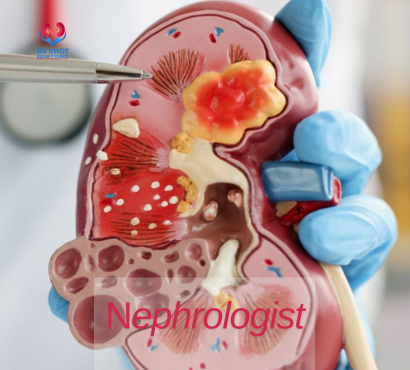Kidneys play a vital role in maintaining overall health by filtering waste, balancing fluids, and regulating blood pressure. When kidney function is impaired, it can lead to serious complications, including chronic kidney disease (CKD), kidney stones, and even kidney failure. This is where nephrologists, or kidney specialists, step in.
A nephrologist is a medical expert specializing in diagnosing, managing, and treating kidney-related conditions. From managing hypertension-induced kidney damage to providing dialysis treatment, nephrologists ensure optimal kidney health.
In this blog, we’ll cover:
✔ What a nephrologist does
✔ Conditions treated by nephrologists
✔ When to see a kidney specialist
✔ Common diagnostic tests and treatments
Who is a Nephrologist?
A nephrologist is a medical doctor specializing in kidney health, kidney disease treatment, and kidney function management. They have advanced training in diagnosing and treating kidney-related disorders, including chronic kidney disease (CKD), kidney infections, kidney stones, and high blood pressure-related kidney damage.
Nephrologists also work closely with other specialists, including urologists, endocrinologists, and cardiologists, to provide comprehensive care for kidney patients.
What Conditions Does a Nephrologist Treat?
A nephrologist treats a variety of kidney-related conditions, including:
1. Chronic Kidney Disease (CKD)
✔ CKD is a progressive condition where the kidneys lose their ability to filter waste over time.
✔ Causes include diabetes, high blood pressure, infections, and genetic disorders.
✔ Symptoms include fatigue, swelling (edema), high blood pressure, and frequent urination.
✔ Treatment involves medications, diet modifications, and dialysis if needed.
2. Kidney Stones
✔ Hard deposits of minerals and salts that form inside the kidneys.
✔ Symptoms include severe lower back pain, blood in urine, and nausea.
✔ Treatment includes hydration, medications, lithotripsy (breaking stones), or surgery.
3. Kidney Infections (Pyelonephritis)
✔ A bacterial infection affecting the kidneys, often stemming from a urinary tract infection (UTI).
✔ Symptoms include fever, chills, back pain, and painful urination.
✔ Treatment involves antibiotics and fluids.
4. Glomerulonephritis
✔ Inflammation of the kidney’s filtering units (glomeruli) due to autoimmune diseases or infections.
✔ Symptoms include protein in urine, swelling, and high blood pressure.
✔ Treatment includes immunosuppressants and steroids.
5. Acute Kidney Injury (AKI)
✔ A sudden loss of kidney function due to infections, dehydration, or medications.
✔ Symptoms include reduced urine output, confusion, swelling, and nausea.
✔ Treatment includes hydration, medication adjustments, and dialysis if necessary.
6. Polycystic Kidney Disease (PKD)
✔ A genetic disorder where fluid-filled cysts develop in the kidneys.
✔ Symptoms include high blood pressure, pain, and kidney enlargement.
✔ Treatment includes medications and lifestyle changes.
7. Hypertension-Related Kidney Disease
✔ Uncontrolled high blood pressure can damage kidney blood vessels over time.
✔ Nephrologists help manage hypertension to protect kidney function.
8. Electrolyte and Fluid Imbalances
✔ Kidneys help maintain sodium, potassium, and calcium balance in the body.
✔ Nephrologists treat imbalances caused by kidney dysfunction.
9. End-Stage Renal Disease (ESRD) & Dialysis Care
✔ ESRD occurs when kidneys fail completely and can no longer filter waste.
✔ Treatment options include dialysis (hemodialysis or peritoneal dialysis) or kidney transplant.
When Should You See a Nephrologist?
It is essential to consult a nephrologist if you experience:
✔ Persistent swelling in legs, feet, or face (fluid retention)
✔ High blood pressure that is difficult to control
✔ Blood or protein in urine
✔ Unexplained fatigue, nausea, or decreased urine output
✔ Frequent kidney stones or recurrent urinary tract infections
✔ Family history of kidney disease
Early intervention can prevent kidney disease progression and reduce complications.
How Does a Nephrologist Diagnose Kidney Diseases?
Nephrologists use several tests and screenings to diagnose kidney conditions, including:
1. Blood Tests
✔ Serum Creatinine – Measures kidney function.
✔ Blood Urea Nitrogen (BUN) – Evaluates waste accumulation.
✔ Glomerular Filtration Rate (GFR) – Estimates kidney function.
2. Urine Tests
✔ Urinalysis – Detects protein, blood, or infection.
✔ 24-hour Urine Test – Evaluates kidney filtration capacity.
3. Imaging Tests
✔ Ultrasound, CT Scan, or MRI – Detects kidney abnormalities.
4. Kidney Biopsy
✔ A small kidney tissue sample is taken for detailed microscopic analysis.
Treatment Options for Kidney Diseases
Depending on the severity of kidney disease, nephrologists may recommend:
1. Lifestyle Modifications
✔ Low-sodium diet to manage blood pressure
✔ Increased water intake to prevent kidney stones
✔ Weight management and exercise to control diabetes
2. Medications
✔ Diuretics for swelling
✔ Blood pressure medications (ACE inhibitors, ARBs)
✔ Phosphate binders and vitamin D supplements for CKD
3. Dialysis
✔ Hemodialysis – A machine filters waste from the blood.
✔ Peritoneal Dialysis – Uses the abdominal lining to remove waste.
4. Kidney Transplant
✔ A healthy donor kidney replaces the failing kidney.
Nephrologists play a critical role in maintaining kidney health and treating kidney disorders. From early detection of kidney disease to advanced treatments like dialysis and kidney transplants, they ensure patients receive the best care possible.
If you experience persistent swelling, blood in urine, or uncontrolled high blood pressure, consult a nephrologist immediately. Early diagnosis and timely treatment can help protect your kidney function and improve overall health.
FAQs
1. What is the difference between a nephrologist and a urologist?
✔ A nephrologist specializes in kidney diseases and function, while a urologist focuses on the urinary tract, bladder, and male reproductive system.
2. Can kidney disease be reversed?
✔ Acute kidney injury (AKI) can sometimes be reversed with treatment. However, chronic kidney disease (CKD) is progressive and requires lifelong management.
3. How can I keep my kidneys healthy?
✔ Maintain normal blood pressure and sugar levels, stay hydrated, eat a balanced diet, avoid excessive painkillers, and get regular kidney function tests.

